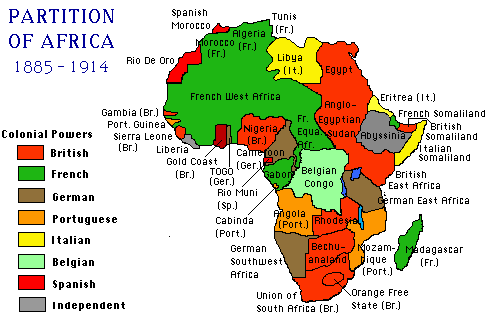European colonies in Africa

The history of Africa has many millennia. According to some scientific hypotheses, in Africa, the first people appeared, who subsequently multiplied and settled all other lands of our planet (except Antarctica). So, if these hypotheses are to believe, Africa is the cradle of humanity. And it is not strange that many people draw to this continent, and they returned, sometimes as explorers, missionaries, and sometimes as conquerors, such is our human nature.
The first European colonies in Africa began to appear at the beginning of the 15th – 16th century. The British and French showed a genuine interest in North Africa, and especially in one of the cradles of human civilizations – Egypt with its majestic pyramids and the mysterious Sphinx.
The Portuguese were the first to penetrate West Africa, creating their colonies there. Subsequently, representatives of other European countries joined them: Holland, Belgium, Germany.
The most significant peak of colonialism in Africa fell in the 19th century; here is an interesting fact: at the beginning of the nineteenth century, only 10% of African territories were European colonies, but at its end, 90%, Of African lands were already European colonies.
Only two African countries managed to maintain complete independence: Ethiopia and East Sudan. All the rest of the countries were under somebody’s heel, so many countries of North Africa belonged to France: Algeria, Tunisia, Morocco; in each of them, French domination establish by force.
For some other countries, such as the already mentioned Egypt, there was even a desperate military struggle between France and England. The latter also did not mind taking possession of this tidbit. Still, in Egypt, the British had to meet with a solid and talented enemy, the famous General Napoleon Bonaparte, who would soon become the French emperor, conquer Europe, and reach Moscow. Although further military defeats of Napoleon also diminished the influence of France in North Africa, and Egypt, in the end, fell to the British.
The Portuguese, thanks to their brave navigators and cartographers, were the first to reach West Africa, where they entered into numerous contacts with the local population and established their colonies; Angola became the most significant Portuguese colony in West Africa, a vast African country, whose area is several times larger than the area of tiny Portugal.

The British also did not catch crows and, in addition to Egypt, founded many colonies, both in West and East and South Africa. Subsequently, representatives of other European states came to Africa: the Germans managed to seize part of the territory of West Africa: Cameroon, Togo, and Namibia (the latter country still strongly resembles Germany with its cozy cities, built by the Germans themselves).
Since their appearance, the Belgians, the African coast already occupied by other Europeans, decided to move deeper into the African continent, where they founded their colony in the country of Congo (Central Africa). The Italians received land in eastern Africa: the countries of Somalia and Eritrea became their colonies.
What attracted Europeans to Africa?
First of all, numerous natural resources and human resources – that is, slaves – into which the Europeans actively turned the local population. Then the slaves were taken to the New World for hard labor on local sugar plantations. In general, the slave trade is one of the darkest pages of African history.
Returning to colonialism, in addition to its negative consequences, there were also some positive moments. Europeans brought a particular civilization, culture to Africa, built cities, roads, along with the soldiers that went with Christian missionaries, who wanted to convert the local population to Christianity (be it Protestantism or Catholicism). They did a lot to educate Africans, built schools, taught African natives European languages (primarily English, but also French, Spanish, Portuguese, German) and other sciences.
The decline of colonialism
Sooner or later, it will all finish, and colonialism in Africa has come to an end, the decline of which began in the 60s of the last century. At this time, active social and political movements for the proclamation of independence started in various African countries.
Somewhere it is possible to gain independence peacefully. Somewhere it was not without an armed struggle, as, for example, in the same Angola, where a real war of independence took place against Portuguese rule, which after that turned into a civil war between Angolans who were carried away by the communist ideas (the MPLA party) and those who wanted to build communism in Angola and the Angolans, who did not like it.
Also, the negative influence of colonialism after its collapse was that some newly created African countries contained a diverse cultural and even hostile population. Sometimes this led to real civil wars, as, say, in Nigeria, the former English colony, where after the proclamation of independence in one country, there were tribes hostile to each other.




